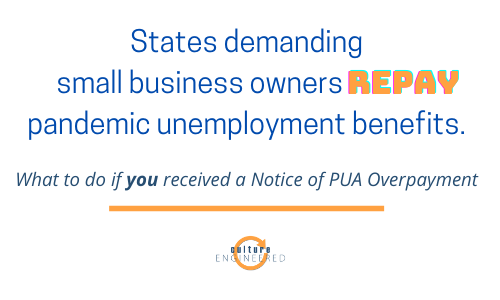Last week, I started getting calls from small business owners stating they personally received Notice of Overpayment letters from state unemployment offices indicating they were to pay back pandemic unemployment assistance (PUA) benefits previously paid to them. Based on a quick review, it appears some state offices determined these business owners ineligible for unemployment under PUA benefits because their companies were also issued funds through either Paycheck Protection Program (PPP) and/or Economic Injury Disaster Loans (EIDL) programs.
Earlier this year when pandemic assistance efforts were first announced, one of the most commonly asked questions was around unemployment eligibility for unemployment if they too received PPP and/or EIDL funds. The answer was yes, so long as the business owner or solopreneur is not double-dipping and EIDL/PPP assistance is being used to cover permissible expenses. Permissible expenses for either program are as follows:
Paycheck Protection Program (PPP) permissible expenses: Payroll costs, interest on mortgages, rent, and utilities (due to likely high subscription, at least 60% of the forgiven amount must have been used for payroll)
Economic Injury Disaster Loan permissible expenses: Working capital & normal operating expenses (ie continuation of health care benefits, rent, utilities, fixed debt payments).
Under the CARES Act, an individual is eligible for PUA benefits if he/she:
- Is not be eligible for regular unemployment benefits, and
- Is unemployed, partially unemployed, or unable or unavailable to work because of certain health or economic consequences of the COVID-19 pandemic.
What to do if you are a business owner who received a notice to repay PUA benefits.
If you have unintentionally or intentionally collected unemployment benefits, most state agencies provide options and in some cases enter into a repayment plan and even request a waiver or reduction in the overpayment amount. Responding sooner than later may be especially beneficial if you are facing a high interest rate.
If you have not unintentionally or intentionally collected unemployment benefits, appeal within the timeframe indicated on the notice of overpayment letter. Once you’ve submitted your timely appeal, follow up with your state agency on your appeal. CARES Act relief efforts and government shutdowns related to COVID resulted in state unemployment offices backlogs. Following up and continuing to monitor your appeal is the best way to avoid any unfavorable determination due to administrative errors.
How to appeal the determination.
Some key pieces of information on these notices are classification/reasoning for overpayment, amount to be repaid (which may a different amount than what you received if you had taxes or child support withheld), the applicable interest rate to be applied to the unpaid balance, and your appeal rights. If you used PPP/EIDL funds appropriately (on permissible expenses) other than your own salary or wages and were eligible to receive PUA under the CARES Act because you were unemployed, partially unemployed, or unable or unavailable to work because of certain health or economic consequences of the COVID-19 pandemic, then you will need to appeal the state’s determination of overpayment. Typically appeals must be made within a relatively short timeframe (10-15 days). Failure to appeal within the timeframe can serve as a waiver of your rights to appeal.
Provide documentation
As part of your appeal, provide details and documentation supporting your eligibility to receive PUA benefits. Documentation showing how PPP and/or EIDL funds were used if other than your own salary/wages can serve as proof that you, personally were not paid with small business assistance funds. It is also recommended to engage your company’s finance or tax professional in the process to ensure your supporting documents are consistent with any documentation they use to report the use of PPP/EIDL funds to the Lender servicing your loan(s).
What happens if you fail to appeal the decision.
Consequences of not appealing the decision will result in your obligation to repay the amount due, plus interest (penalties). Depending on the reasoning for the decision and whether the unemployment office deemed your overpayment as unintentional misrepresentation or intentional misrepresentation (fraud), offices reserve the right to take legal action. Although extremely rare, state unemployment offices can pursue criminal charges for payments they deem fraudulent.
In a year that has been hard on small businesses, it’s been especially difficult on the small business owners responsible for their recovery. Although the CARES Act helped reduce the financial and economic hardships to small businesses brought about by COVID19 shutdowns, the lasting haphazard nature of disaster relief efforts are burdensome. Responding to PUA overpayment letters can be frustrating. Not responding however can lead to even more frustration, and much more burdensome consequences. If you’ve received one of these letters, take the time to respond today and save yourself the stress, time, and frustration later when it’s sure to be exponentially more taxing.
